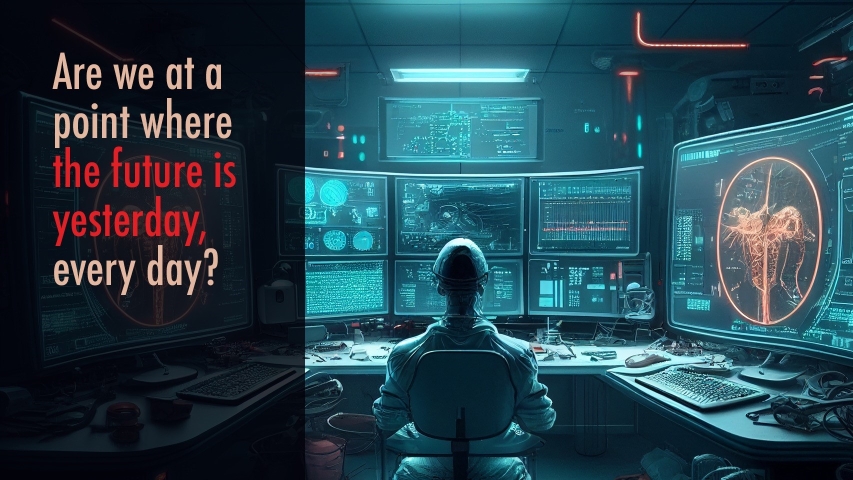
Are we at a point where the future is yesterday, every day?
You probably know that artificial intelligence (AI) is changing the way we do a lot of things, like chatting with friends, shopping online, or creating content, just to name a few. In fact, AI will rock our world forever moving forward. Last week, I had the opportunity of hearing a business futurist speaking on how AI will be transforming businesses and what to expect over the next year, including which departments will be first to fall victim or to benefit from artificial intelligence. Would you be surprised if I say customer service will be the first to be affected?
I was thrilled to be invited to this special talk about the future, I have always looked at the next five years’ forecast in everything, even my own life. I was pumped and ready to learn, but it is not exactly how it turned out.
Although the speaker had prepared his presentation deck the week before, a large part of it was already obsolete or underestimated. I found myself correcting him a few times (which I did feel terrible about) but the truth is that I was constantly thinking that if a futurist has outdated slides because they were prepared few days before, it begs the question: Are we at a point where the future is yesterday, every day?
So here is my attempt on a snapshot to the future. I will look at some of the ways that AI is being used in healthcare right now and what we can expect in the future, including some of the benefits and challenges of AI in healthcare, based on recent research and examples from around the world. I hope you will read it fast because it will change tomorrow.
What AI can do in healthcare
Dr. Chat GPT has passed its medical exam in just a few days of training, and according to a study done a couple of weeks ago(ancient time in today’s terms), AI was found more accurate and more empathetic than doctors by a huge margin. AI is also being used in many different areas of healthcare, such as administration, public health, medical research, medical training, medical professional support, patient engagement, remote medicine, and diagnostics. Here are some examples of how AI is helping in these areas:
Healthcare administration. AI can help with the boring and time-consuming tasks that are part of running a healthcare system, such as billing, scheduling, and documentation. It can also save time and improve accuracy. For example, Philips has made an AI tool that can check if patients are positioned correctly and adjust the settings for CT scans. This can save time, avoid redoing scans, and improve image quality.
Public health. AI can help keep track of and analyze health data for large groups of people, such as disease outbreaks, environmental factors, and social factors that affect health. For example, Google has made an AI tool that can predict how flu and dengue fever will spread based on what people search online, weather data, and past patterns.
Medical research. AI can help speed up and improve medical research, such as finding new drugs, testing them in clinical trials, and reviewing literature. For example, DeepMind has made an AI tool that can figure out how proteins are shaped based on their building blocks. This can help understand how proteins work and interact in different diseases and design new drugs. According to the CEO of Deep mind, AI has created a 3D mapping of all 200 million proteins known to science. The CEO predicts it would have taken humans a billion years to complete this project.
Now, a billion of years is a lot of yesterdays!
Some of the most promising areas to apply AI to healthcare is in medical training. You can teach and train medical professionalsusing AI assisted simulation, virtual reality, and adaptive learning. For example, Osso VR has made a VR platform that can show realistic and interactive surgical training for different procedures. This can help surgeons improve their skills, confidence and reduce mistakes.
The simple fact that AI can, in an instant, search and process thousands of studies on a particular topic and provide valuable information to a doctor or scientist can be a life saver and a game changer. AI can help support and enhance medical professionals by giving them advice, and accelerate diagnostical conclusions.
As previously mentioned, AI can help patients get more involved in their own health and wellness, such as using chatbots, apps, and wearable devices. For example, Babylon Health has made an AI tool that can chat with patients, check their symptoms, and give them advice or refer them to a doctor. If patients need to be monitored, the next gen wireless medical monitoring devices such as those developed by Nouslogic in collaboration with DeviceLab are on the rise. This can help provide healthcare to people who live far away from hospitals or clinics, such as using telemedicine, drones, robots and PM devices. For example, Zipline has made a drone service that can deliver blood and medical supplies to remote areas in Africa.
This year, TheGoodLife.ai launched the First Digital AI Coach that Powers Up Your People and Your Business, a corporate wellness Genii that once trained to get to know an individual provides personalized wellness advice. The Geniikeeps learning about you, checks on you daily and provides quite valuable guidance on your wellness status, and what you can do to improve your condition. I tested it and every day Genii was bored with me because I feel pretty good. Now, joke apart, it is a great tool for employees and for corporations alike. If your mind went straight to the scary big brother moment, no worries, Genii does not provide identifiable data and does not aggregate data for departments of less than fifty people. The advantage for corporations is substantial considering that it would provide a corporate health check-up, and allow to identify systemic or endemic problems.
Diagnostics. The study published in the journal JAMA Internal Medicine, demonstrated that AI can help diagnose diseases and conditions, as well as demonstrating more empathy than physicians. An article in TheGuardian.com related that “Overall, the panel preferred ChatGPT’s responses to those given by a human 79% of the time. ChatGPT responses were also rated good or very good quality 79% of the time, compared with 22% of doctors’ responses, and 45% of the ChatGPT answers were rated empathic or very empathic compared with just 5% of doctors’ replies.”
What to expect in the future
AI is still evolving and improving, so we can expect to see more applications, benefits, and challenges of AI in healthcare in the future. Some of the trends and possibilities that we might see are:
* More collaboration and coordination among different stakeholders in healthcare, such as patients, clinicians, researchers, policymakers, regulators, industry, and civil society.
* More adoption and integration of AI across different domains and levels of healthcare, such as primary care, secondary care, tertiary care, public health, global health, and personal health.
* More innovation and diversity in AI solutions for healthcare, such as using new data sources, methods, models, platforms, and devices.
In conclusion, just like most people, I am thrilled to see how AI will transform healthcare, make it more accessible, more affordable, more accurate, better outreach and accelerate innovation that will enhance our lives. We could not wait a billion years; hence it is welcome considering that we have reached eight billion people on the planet.
I am, of course, equally worried of what it will mean for data privacy and security, the elimination of jobs, the potential lack of transparency and explainability, the liability and accountability, the ethical and social implications, and the unknown.
Overall, and amid all the industries integrating AI in their business, I predict that healthcare will be the one benefiting the most from the introduction of AI, for the benefit of humanity. The pace in which change will be applied will be the greatest challenge for people to manage and integrate, because every day, what they thought was the future of their business, will become their yesterday.

